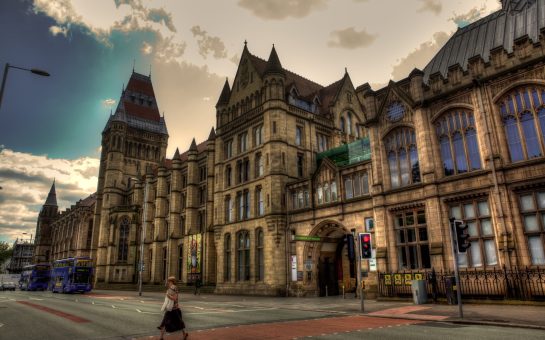Modern technology has made selling your labour as easy as liking a post on Facebook.
It’s estimated that over a million people in the UK work in the gig economy – a term referring to the system wherein people use apps to provide a service, made notorious and normalised by behemoths such as Deliveroo and Uber.
Flexibility and the opportunity to be your own boss are touted as the main advantages of working in the gig economy.
Unfortunately, these come intertwined with less desirable qualities: insecurity, and the difficulty of fighting for better working conditions.
Around 15,000 people in the UK work for Deliveroo – although not in the traditional sense, as they have self-employed status, meaning riders do not receive sick or holiday pay that is the right of other employees.
Workers may be able to choose their own hours but the power is still ultimately in the hands of the huge companies they work for, who many argue are using this legal loophole to take advantage of an often vulnerable workforce.
In May, a Deliveroo driver in London was beaten to death by bike thieves, and there have been 12 deaths of food couriers internationally for various companies in the past year.
From Mexico City to St. Petersburg to London, workers for companies including Uber Eats and Deliveroo have died at work.
A statement from Finnish organisation Justice 4 Couriers said: “These are not merely traffic accidents, sudden illnesses or acts of violence, but work-related incidents, which are a result of the poor and piecemeal pay, which forces couriers to ride longer, faster and harder.
“They are a result of the lack of sick leave and insurances and the fact that couriers cannot afford to lose their means of work, for which they themselves pay.
“When a courier gets injured or killed at work, the companies do not have to take any responsibility. The courier pays for possible medical and repair expenses and loses their income from the time they are incapacitated, if they are lucky enough not to lose their lives.”
While these deaths may be an extreme example of what can happen to riders, the vulnerabilities inherent in the conditions of couriers are worth exploring.
‘DISGUSTING’ TREATMENT
Daniel is a courier in Manchester who works around 30-40 hours a week for Deliveroo. Like many others, he joined because of the flexibility available, and appreciated the environmentally sustainable way of making a living.
However, in recent weeks, Deliveroo have changed the payment system so that he is now cycling up to 100 miles a day – double the 40-50 miles he previously covered – for around the same amount of money. In addition, the fees for all distances have been cut.
“There’s a lot of pluses to the job, but the way Deliveroo have treated us in the last few weeks is disgusting, really,” he told MM.
Deliveroo’s framework does not guarantee its workers minimum wage. Sometimes Daniel might have to make a round trip from Chorlton to the city centre for a single delivery, while the waiting times at the restaurant increase the journey time.
“You can get towards certainly 30-40 minutes up to an hour – for 5 or 6 pounds,” he said.
A rider in London described the exhausting lengths he has to go to just to make enough money to live. “These days I have to work 16 hours, 14 hours – it’s really rare that I’ll work for less than 12 hours.
“Even if I make 100 pounds, if I take 16 hours to make it, if you divide that’s much less than the minimum wage.”
All of the couriers MM spoke to described the lack of stable, reliable pay – their hours necessarily fluctuate with demand and can dip when people aren’t buying as many takeaways, such as during the summer months when flocks of students head home.
But overhiring, particularly in London, has meant that there is an abundance of workers scrabbling for the same orders – and they aren’t paid for the hours spent waiting for them to come in.
One rider described Deliveroo as “greedy and dodgy – they are hiring more and more drivers so they can keep their profits. They are taking us further and further and decreasing the payments more and more. They don’t care about us.”
Without a fixed-term employment, Deliveroo workers not only sacrifice holiday pay, but Daniel described how if someone were to take a week off, they would lose their statistics and be unable to work on their return. “They basically don’t explain how you can take a holiday without losing your hours.”
On top of this, couriers have to face safety concerns that naturally arise when your workplace is the streets. “It’s very tiring in terms of the distances if you’re cycling, and dangerous in terms of traffic and pollution – it’s not the world’s safest job,” said Daniel.
“If you have an accident, you’re gonna be in the hospital for 3-4 months and no one’s gonna pay for you,” one rider told MM. Additionally, the constant threat of muggings is a risk that comes with the job.
“We don’t have protection – Deliveroo doesn’t care if you go to a place where it’s dangerous, where people are stealing bikes.”
He described one such incident: “A guy stopped me with a knife, I said please don’t do it because that’s my income.” Luckily, the man took pity on him.
The risks that all cyclists unfortunately have to be wary of are enhanced for couriers because of the nature of their precarious work.
Sam, a courier for Deliveroo and Uber Eats and the national organiser for IWW Couriers Network, said: “The pay incentivises us to travel as quickly as possible – to potentially compromise our own safety for the sake of earning a living.”
With all these issues surrounding the daily realities of riding, and the atomised nature of the job, these gig economy workers face new challenges in pushing for their rights. In 2018, Deliveroo workers lost a court battle for the right to unionise.
However, by working alongside the Industrial Workers of the World and setting up networks in cities across the country, they have devised alternative means of cooperation.
An informal network of couriers communicating largely via Whatsapp chats plans actions and exchanges information. There are small systems of mutual aid being set up, such as in Leeds, where extra bikes and battery packs are available for those in need.
And there are plans to further coordinate actions not just across the UK but internationally – fighting against the same problematic systems on a large scale in order to show solidarity and increase the chance of progress.
On 4 October 2018, workers across the UK from McDonald’s, TGI Fridays, and Wetherspoons went on strike to demand better conditions and a £10 an hour wage, while fast food workers internationally also demonstrated.
Couriers from Deliveroo and Uber Eats coordinated with the strikers, the synchronised action emphasising the fact that the struggles of gig economy workers are not inherent to one particular system. The long, ongoing fight for fair pay, an end to insecure work, and the right to a union is universal.
‘WE’RE ALL VICTIMS’
Strikes in Glasgow succeeded in a pay increase. But with Deliveroo continuing to drive down the riders’ pay across the country, further action seems likely. “We are the mechanical parts – without us, they don’t have a company,” said one worker.
“I live in a country where people have rights, and Deliveroo has to respect these rights and what people do for them,” he added.
“You cannot get anything from companies without striking, you need to fight,” said another courier. “But we are not united because there are too many drivers.” He added that many people refused to go on strike for fear of losing their job.
While workers nationwide figure out successful ways of coordinating, Deliveroo remain reluctant to recognise anything resembling a union of their workers, making a constructive dialogue between workers and the company near impossible.
Sam said: “There’s this question of getting into negotiations – getting them to formally acknowledge us which they don’t like to do. Even when we’ve won concessions, like the pay going up in Glasgow, they’d never admit that it was because of us – that is an ongoing battle.”
With conditions in Manchester for riders currently so dire, the lack of communication between Deliveroo and its workers and the enormous distances he’s expected to cycle has proved the last straw for Daniel.
“I don’t know if they can fix what they’ve done, it’s too late – I’m looking for other work now.
“Even if they put the wages up like the old system, when you’re working with someone you need to have a bit of trust with what they’re doing.”
Despite the inherent problems of the conditions couriers deal with, they were eager to emphasise that, at its best, the gig economy works for them. For many, the work is largely enjoyable, while the fact that they don’t have to answer to a boss provides a form of liberation that many other jobs simply can’t provide.
“Presenting couriers as the victims of this situation is not something that the workers identify with,” said Sam.
“People are often quite proud of their work – they go out and work hard and come home having earned 50 quid for 4 hours work. And that doesn’t mean we don’t want security, it doesn’t mean we won’t fight and organise for more security – but the job market being what it is, we’re all victims.”
Main image courtesy of Steve Eason via Flickr, with thanks.



